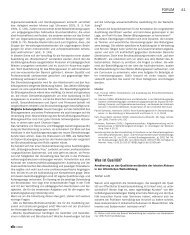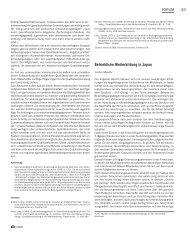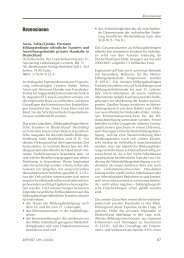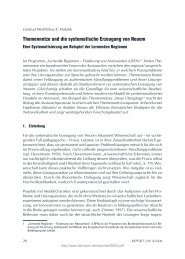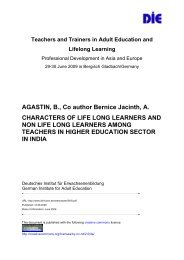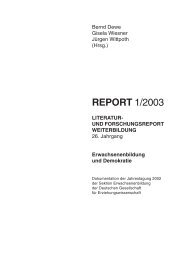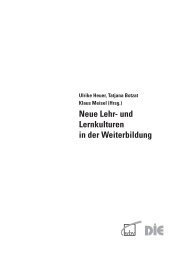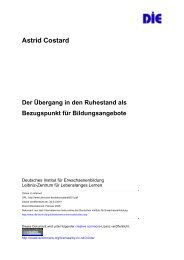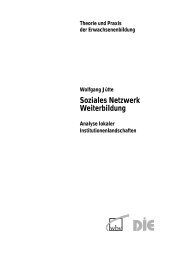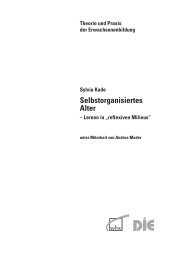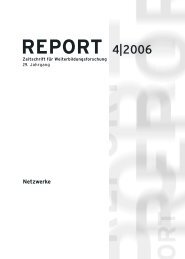Accreditation of Prior Experiential Learning (APEL)
Accreditation of Prior Experiential Learning (APEL)
Accreditation of Prior Experiential Learning (APEL)
Create successful ePaper yourself
Turn your PDF publications into a flip-book with our unique Google optimized e-Paper software.
Gibbons et al. (1984) maintain that mode 1 knowledge associated with modernity is<br />
being replaced by mode 2 knowledge whereby a range <strong>of</strong> knowledge producers, from<br />
inside and outside universities, working together in applying knowledge to a particular<br />
problem. In this scenario multidisciplinarity becomes the norm. This is now reflected<br />
in the requirements <strong>of</strong> key funders such as the Economic and Social Research Council<br />
(ESRC) in the UK who stress multidisciplinary approaches and the inclusion <strong>of</strong> end<br />
users in the research process as being essential. Delanty (2001, p 5) argues that in a<br />
knowledge society: “As a result <strong>of</strong> mass education, social protest and the new social<br />
movements, and the rise <strong>of</strong> new kinds <strong>of</strong> technologies, knowledge is more spread through<br />
society than ever before; it is no longer confined to elites but is more publicly available.<br />
Thus lay knowledge can no longer be separated from pr<strong>of</strong>essional knowledge.”<br />
In postmodernity, it is argued, there is a move towards a reflexive turn in knowledge<br />
production. <strong>APEL</strong> questions traditional assumptions and attitudes about knowledge<br />
and academic knowledge in particular through advocating life/work experiences and<br />
lay knowledge as valid forms <strong>of</strong> knowledge. Its importance lies in bridging formal,<br />
non-formal and informal knowledge. <strong>APEL</strong> also challenges traditional ways <strong>of</strong> teaching<br />
and learning in universities. Firstly, the subjectivity and autonomy <strong>of</strong> the learner<br />
and the learner’s life/work experiences are placed central to the learning process and<br />
the knowledge base. The knowledge and skills which the learner brings to the learning<br />
situation is recognised as “really useful knowledge” (Johnson 1988). Life experiences<br />
are integrated with academic knowledge. The stress is on reflective learning and the<br />
meaning <strong>of</strong> what it meant to learn this or that in a particular social context. <strong>APEL</strong><br />
“allows learners to examine the wider circumstances, issues and problems that have<br />
influenced their lives and to situate their own experience within the social organisation”<br />
(Mandell/Michelson 1990, p 5). Secondly, innovative forms <strong>of</strong> assessment, in<br />
terms <strong>of</strong> university education, have been introduced.<br />
As noted earlier the notion <strong>of</strong> starting with the life experiences <strong>of</strong> the learner as a focus<br />
in the curriculum on them is not new within adult education. The work <strong>of</strong> Freire is<br />
influential here. Brookfield, Kolb and Mezirow also stress the importance <strong>of</strong> experience<br />
and reflective learning for adult learners. <strong>APEL</strong> is about assessing and accrediting<br />
personal learning and experiences for self-development and thus has the potential to<br />
empower the learner and change learner and self-identities. Empowerment is a nebulous<br />
concept but for Gore: “Empowerment carries with it an agent <strong>of</strong> empowerment<br />
(someone, or something, doing the empowering), a notion <strong>of</strong> power as property (to<br />
empower implies to give or confer power), and a vision or desired end state (some<br />
vision <strong>of</strong> what it is to be empowered and the possibility <strong>of</strong> a state <strong>of</strong> empowerment)”<br />
(Gore 1993, pp 73-74).<br />
In relation to adult education Antikainen et al. (1996) draw upon Mezirow’s (1981)<br />
concept <strong>of</strong> “critical reflectivity” in their definition <strong>of</strong> empowerment. For them empowerment<br />
refers “to an experience that changes an individual’s understanding <strong>of</strong> the world“<br />
(Antikainen 1996, pp 70-71). In the context <strong>of</strong> <strong>APEL</strong> Evans emphasises that: “Empower-<br />
64


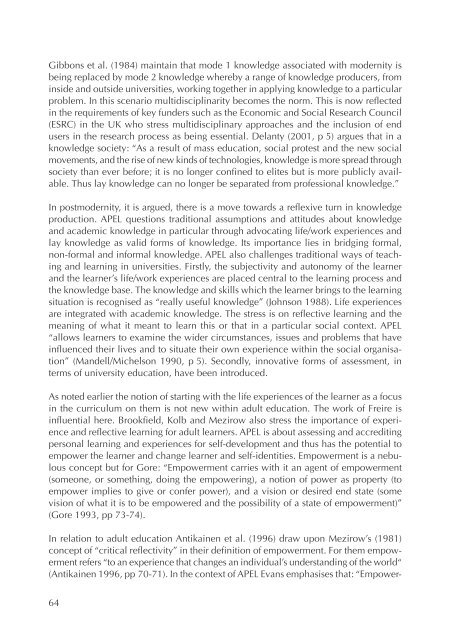
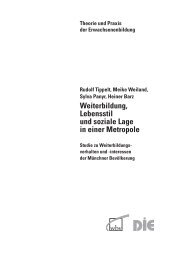
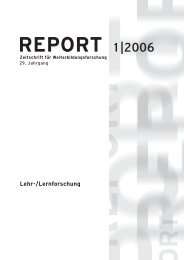
![PDF [KB 892] - Deutsches Institut für Erwachsenenbildung](https://img.yumpu.com/7495168/1/144x260/pdf-kb-892-deutsches-institut-fur-erwachsenenbildung.jpg?quality=85)
